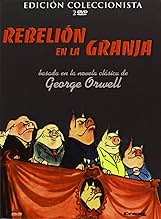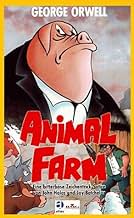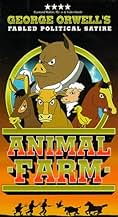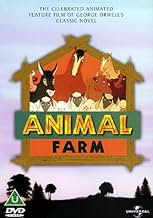Une révolution menée par les résidents de la basse-cour contre le fermier réussit, mais la situation tourne mal lorsque les vainqueurs établissent une nouvelle tyrannie dans leur groupe.Une révolution menée par les résidents de la basse-cour contre le fermier réussit, mais la situation tourne mal lorsque les vainqueurs établissent une nouvelle tyrannie dans leur groupe.Une révolution menée par les résidents de la basse-cour contre le fermier réussit, mais la situation tourne mal lorsque les vainqueurs établissent une nouvelle tyrannie dans leur groupe.
- Réalisation
- Scénario
- Casting principal
- Nomination aux 1 BAFTA Award
- 1 nomination au total
- Narrator
- (voix)
Avis à la une
George Orwell wrote a fable about revolution betrayed, and laced it liberally with references to the Russian Revolution. Much of this dimension is still visible in the film. A wise pig, Old Major, proclaims the revolution before dying. Old Major is sort of a Marx figure, although, to me, he seems to be drawn to look like Churchill. Proclamation made, nothing happens. However Farmer Jones is drunk and the animals don't get their feed. The Tsar's mismanagement produced his revolution as well. Russian parallels continue. Counter-revolutionary farmers (capitalist states) attack Animal Farm but fail. One pig, Snowball (Trotsky), tries to spread revolution to other farms (world revolution), but is murdered by his associate, Napoleon (Stalin), who prefers to consolidate his power at home. The film also has Five Year Plans, industrialization programmes, forcible collectivization, showtrials with quick executions afterwards, and historical revisionism.
But I saw this film perhaps three times long before I understood anything much about the political parallels. I liked it as much then if not more so. Knowledge of that side does tend to turn the film into an intellectual experience, but viewers who have no prior exposure to the historical facts receive the raw emotional jolt which more politically astute critics maintain the film lacks.
Regardless of whether you know a lot about Russia and her Revolution, or nothing at all, Britain's first animated feature is a film with a strong story which adults and mature kids should find absorbing, maybe even "devastating", as The New York Times once claimed back in the days when Stalin was still lying warm in his grave, if not in anyone's heart.
As for a rating on "Animal Farm", the sheep say, "Four stars good, two stars b-a-a-a-d!"
A not-so-veiled criticism of totalitarianism under Stalin, many events portrayed in the DVD correspond to real events that took place in the Soviet Union. However, the DVD may be understood as a critique of totalitarianism, no matter where or when it appears.
Maurice Denham, the Mel Blanc of England, performed the voices of all the animals in the film. It is worth seeing the DVD for that alone.
There is no doubting the value of the story or the intelligence of the source material and the decision of the film to stick closely to Orwell's book is where its strength comes from. I love the story and always have, it is well written, sharply judgemental and a cautionary tale that is rightly used heavily in schools. The socialist system rises up but soon some want more rights than others and soon the leaders of the rebellion start emulating the habits of Jones and the, once proud standards are gradually watered down. The broad characters are well written and, although they don't have any depth, they fulfil the requirements of the story telling.
The animation looks dated but given that it is now over 50 years old this is no real surprise, nor a problem. No, the problem with the film is the delivery. Heath is the narrator while Denham does the voices of all the animals; now this sounds like Denham will be carrying the majority of the film but in reality he has little to do because the film is mostly delivered in narration. This is all well and good but it does make the film feel like it is more an audio book with pictures rather than a film. As a result there isn't the emotional impact that there should have been and, although you feel sorry for the characters it is more a general feeling rather than a genuine care for the "people".
Many reviewers have commented on the ending and they are right to do so because if even an ending felt tacked on to produce a "happy" conclusion then it was this one. I understand that no producer wants to try and sell a negative product but the end of the book was fine as it was it made a firm point and left a memorable impression whereas this one just feels wrong. Overall though it is a good film that is worth seeing due to the source material but the narrative approach lessens its value as a film and made me think that I should have just reread the book.
Dealing with dictatorship, communist theory, military warlords, the democratic process and political theories, Animal Farm throws so much at the viewer / reader that it is still a highly acclaimed story. Whether it is suitable for a young audience, that is up to the individual viewer to decide.
Different animals represent different people. The wise old pig Old Major represents Karl Marx and the beginning of communist teachings; Farmer Jones is Czar Nicholas II and represents the old regime; Napoleon and Snowball the pigs are respectively the ruthless Joseph Stalin and idealistic Leon Trotsky; the pack of dogs are the secret police and violent state enforcement; Boxer represents the hard working peasants; Benjamin, the wise but powerless individual; the sheep the unthinking masses. While Manor Farm itself is Russia and Animal Farm the Soviet Union.
The format of the fable works extremely well in illustrating the story of the formation of the USSR. This cartoon version of it is in the main a pretty impressive adaption. While the ending goes against the Dystopian one favoured by Orwell, it's not really surprising that it does this, although it's unfortunate. But it doesn't really damage the film very much as it's central idea remains intact. The animation itself is good enough, and even though there is a lot of narration I didn't consider this to be a problem. I thought that all things considered this was a good stab at an iconic bit of literature.
Le saviez-vous
- AnecdotesMany parents were alarmed at the bleakness of the film, having taken their children thinking it was a film along the lines of a Walt Disney cartoon.
- GaffesAt one point the phrase "with sheets" is hastily added to the first rule, but in subsequent shots of the rules it is no longer there.
- Citations
[The laws of Animal Farm are being read]
Snowball: No animal shall drink alcohol. No animal shall sleep in a bed. Four legs good, two legs bad.
[The chickens are very annoyed at this rule]
Squealer: Wings count as legs.
[The chickens realize that Squealer is right]
Group of sheep: Four legs good, two legs bad. Four legs good, two legs bad.
Snowball: [continuing the reading of the laws] No animal shall kill another animal. All animals are equal.
- Versions alternativesIn the Extended Edition (in the USA coming in October 2024), the only scene (after Squealer says "Long live Napoleon!" two times) shows all the animals and new animals cheering (cows, sheep, horses, pink pigs, llamas, chickens, peacocks, and goats) for Squealer before Benjamin runs away from Squealer and the barking dogs.
- ConnexionsFeatured in Le Petit Monde de Charlotte (1973)
- Bandes originalesSnowball Banished
Written by Leopold Stokowski
Meilleurs choix
Détails
- Durée
- 1h 12min(72 min)























